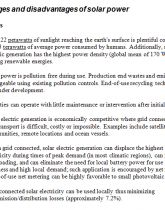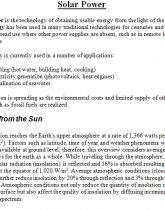Esej: Solar power (Energy from the Sun, Advantages and disadvantages of solar power)
Skryť detaily | Obľúbený- Kvalita:82,2 %
- Typ:Esej
- Univerzita:Trenčianska univerzita Alexandra Dubčeka v Trenčíne
- Fakulta:Fakulta sociálno-ekonomických vzťahov
- Kategória:Jazyky
- Podkategória:Angličtina
- Predmet:Anglický jazyk
- Autor:flyskinka
- Ročník:3. ročník
- Rozsah A4:3 strán
- Zobrazené:1 430 x
- Stiahnuté:0 x
- Veľkosť:0,1 MB
- Formát a prípona:MS Office Word (.doc)
- Jazyk:slovenský
- ID projektu:14030
- Posledna úprava:06.04.2022
Solar power is the technology of obtaining usable energy from the light of the Sun. Solar energy has been used in many traditional technologies for centuries and has come into widespread use where other power supplies are absent, such as in remote locations and in space.
Solar energy is currently used in a number of applications:
- Heating (hot water, building heat, cooking)
- Electricity generation (photovoltaics, heat engines)
- Desalination of seawater.
Its application is spreading as the environmental costs and limited supply of other power sources such as fossil fuels are realized.
Energy from the Sun
Solar radiation reaches the Earth's upper atmosphere at a rate of 1,366 watts per square meter (W/m2). Factors such as latitude, time of year and weather phenomena will reduce the energy available at ground level; therefore, this overview considers average solar energy flows for the earth as a whole. While traveling through the atmosphere, 6% of the incoming solar radiation (insolation) is reflected and 16% is absorbed resulting in a peak irradiance at the equator of 1,020 W/m². Average atmospheric conditions (clouds, dust, pollution) further reduce insolation by 20% through reflection and 3% through absorption. Atmospheric conditions not only reduce the quantity of insolation reaching the earth's surface but also affect the quality of insolation by diffusing incoming light and altering its spectrum.
...
Solar energy is currently used in a number of applications:
- Heating (hot water, building heat, cooking)
- Electricity generation (photovoltaics, heat engines)
- Desalination of seawater.
Its application is spreading as the environmental costs and limited supply of other power sources such as fossil fuels are realized.
Energy from the Sun
Solar radiation reaches the Earth's upper atmosphere at a rate of 1,366 watts per square meter (W/m2). Factors such as latitude, time of year and weather phenomena will reduce the energy available at ground level; therefore, this overview considers average solar energy flows for the earth as a whole. While traveling through the atmosphere, 6% of the incoming solar radiation (insolation) is reflected and 16% is absorbed resulting in a peak irradiance at the equator of 1,020 W/m². Average atmospheric conditions (clouds, dust, pollution) further reduce insolation by 20% through reflection and 3% through absorption. Atmospheric conditions not only reduce the quantity of insolation reaching the earth's surface but also affect the quality of insolation by diffusing incoming light and altering its spectrum.
...


